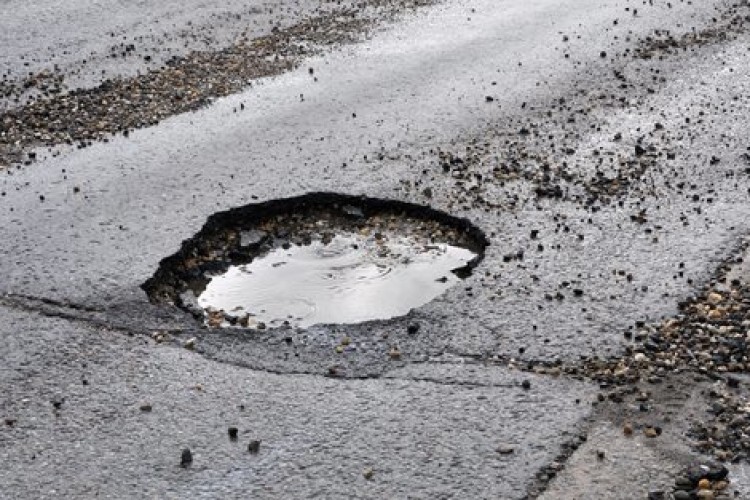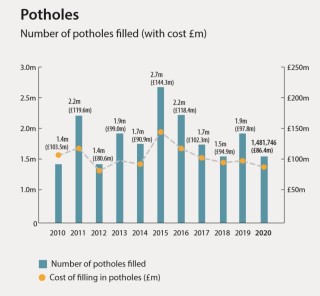The ALARM survey is produced each spring by the Asphalt Industry Alliance (AIA) as part of its campaign to get more public money to be spent on asphalt.
Earlier this month chancellor Rishi Sunak’s spend-spend-spend budget included an additional £2.5bn for the ‘pothole fund’. The AIA said that, while this was a step in the right direction, it was not enough to plug the gap in local road maintenance budgets, let alone the rising backlog of repairs.
Now in its 25th year, the 2020 ALARM survey shows that the ‘green shoots of improving conditions reported in 2019 have not been sustained’, with local authorities having to cope with an average drop in overall highway maintenance budgets of 16%.
ALARM 2020 reports that the shortfall is now an average of £4.9m for local authorities across England and Wales, up from £3.9m last year.
This year there are 7,240 fewer miles of roads reported to be in GOOD structural condition, with 15 years or more of life remaining, and 1,100 more miles of roads classed as POOR, with less than five years’ life remaining, bringing the total in this category to 42,675 miles. Coupled with this is a continued increase in the amount of road classed as ADEQUATE, with between 5-15 years’ life remaining.
Rick Green, chair of the AIA, said: “Highway maintenance budgets have dropped back to where they were two years ago. Over the past 25 years we have repeatedly seen this pattern of short-term cash injections to stem accelerating decline, only to be followed by further years of underfunding. This stop-start approach has been wasteful and does nothing to improve the condition of local road network on which we all rely. In fact, it has just contributed to a rising bill to put things right.
“The £2.5bn extra funding over the next five years announced in the budget will certainly be welcomed by hard-pressed local authority highway teams dealing with increasing demands on smaller budgets, as well as the effects of extreme weather events, such as the recent storms, on an ageing network.
“However, £500m extra a year divided across English local authorities is a long way off the one-time catch-up cost of £11.14bn that ALARM 2020 indicates is needed to bring our local roads across England, London and Wales up to a level from which they can be maintained cost effectively going forward.

“What’s needed is additional and sustained investment to help underpin the government’s levelling-up strategy and social cohesion goals, as well as complement its ambitions for more sustainable modes of transport.”
Local Government Association transport spokesman David Renard said: “Councils share the frustration of motorists about the state of our local roads and, as this survey shows, fixing our roads is a priority for them. Despite the financial pressures councils face, they continue to fix a pothole every 21 seconds.
“Yet despite these efforts, it is clear that our roads are deteriorating at a faster rate than can be repaired by councils, with the cost of clearing our national roads backlog on the rise and now over £10bn.
“To help councils go further to maintain our roads, they need devolved infrastructure and public transport budgets – ensuring a funding allocation in advance for five years, which would enable them to deliver infrastructure improvements that allow people to move around in less carbon intensive and more sustainable ways.”
Steve Spender, chief executive of the Institute of Highway Engineers, said: “Once again, this year’s report provides a clear indication that there is a need for an increase in real terms of the funding necessary to bring the network back to a suitable standard. With average highway maintenance budgets down by approximately 16%, and the estimated cost for getting our roads back to reasonable state of over £11bn, this can only create a situation where reactive repairs are the chosen option rather than the necessary proactive planned approach.”
AA president Edmund King said: “With roads being resurfaced on average once every 76 years, we’d recommend lucky residents celebrate the moment as it truly is a once in a lifetime achievement.”
The full 2020 ALARM survey is available www.asphaltuk.org
Got a story? Email news@theconstructionindex.co.uk




